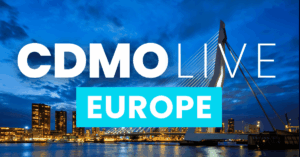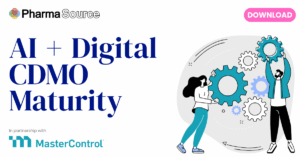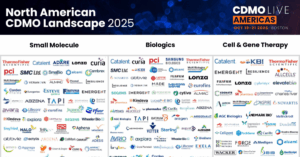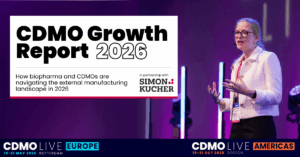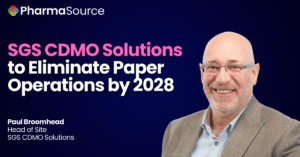“We hide behind the hubris of science, but we still have a lot of operational challenges to really impact the lives of our patients,” warns Sanjay Srivastava, Managing Director of Accenture’s Centre of Excellence for Cell & Gene Therapy.
This sobering assessment cuts through the hype surrounding cell and gene therapies, highlighting the critical need to address practical hurdles in bringing these revolutionary treatments to patients at scale.
Sanjay Srivastava blends academic rigour with consulting acumen. With over a decade focused exclusively on cell and gene therapy, including involvement in launching the first CAR-T therapies, Sanjay’s insights stem from hands-on experience in navigating the complex landscape of this evolving sector.
In this PharmaSource podcast episode, Sanjay unpacks the intricacies of cell and gene therapy manufacturing, offering practical solutions to key challenges in scaling production, implementing automation, and balancing innovation with regulatory requirements.
His analysis provides a roadmap for companies striving to translate scientific breakthroughs into operational success.
Addressing the Operational Challenges in Cell and Gene Therapy
While scientific advancements in cell and gene therapy are progressing rapidly, operational bottlenecks are limiting patient access. Sanjay notes, “Globally, how many eligible patients are really getting CAR-Ts? Less than 5%, and that’s not ideal.”
This stark reality underscores the need for practical solutions to manufacturing and delivery challenges.
To address these issues, Sanjay recommends a multi-faceted approach designed to “bring the therapies to the patient, instead to taking patient to the therapy”:
- Decentralised Manufacturing: “We can bring [cell extraction] closer to the patient. That can happen by mobile apheresis labs, it can happen at blood donation centres,” Sanjay suggests. This approach could reduce logistics complexities and improve patient access.
- Point-of-Care Manufacturing: Looking ahead, Sanjay envisions a future where “I can have a desktop machine that I do manufacturing right there at the hospital, just like we do diagnostics today.” While this presents regulatory and training challenges, it could dramatically streamline the production process.
- Improved Scheduling and Resource Management: Current manual processes and spreadsheet-based scheduling are inadequate for managing the complexities of cell therapy production. Sanjay advises, “We need sophisticated scheduling algorithms and solutions” to better manage patient variability and production slot allocation.
Harness Automation and Data Analytics
While automation is often touted as the full solution, Sanjay cautions against viewing it as a panacea. Instead, he advocates for a strategic approach to automation and digitisation:
“We need to understand the attributes, the key attributes of the raw material, which is the cells, T cells, or stem cells, and their impact on the process, on the recipe,” Sanjay explains.
Automation should be leveraged not just for cost reduction, but also to gain deeper insights into process biology. “If latter is not understood, we will keep having product quality issues and out of spec products, leading to loss of revenue” adds Sanjay.
Data-Driven Process Optimisation
By digitising processes, companies can better interrogate data and conduct experiments to optimise production. Sanjay advises, “We use automation and robotics not just to decrease cost, but also to understand process biology.”
For early-stage companies, Sanjay suggests focusing on digital solutions that offer the most value for limited resources. For commercial-stage products, he recommends carefully evaluating the regulatory implications of process changes before implementing new automation technologies.
Navigate Regulatory and Market Access Challenges
The accelerated approval pathways for cell and gene therapies create both opportunities and challenges. Sanjay shares the following advice:
1. Proactive Regulatory Engagement
Sanjay advises companies to engage with regulators early and often, particularly when considering significant manufacturing changes. This can help anticipate and address potential regulatory hurdles.
2. Robust Data Generation Strategies
To address reimbursement challenges, Sanjay recommends developing “creative ways to generate data and to convince the medical utility of the therapy.” This might include real-world evidence collection and innovative payment models.
“We need to prove clinical validity and clinical utility.” says Sanjay. “Clinical validity is important to know if we are treating the ‘most suitable’ patient and clinical utility is about outcomes.”
3. Balance Speed and Process Optimisation
“Develop for learning instead of developing for the clinic” says Sanjay.
While rushing to clinic is tempting, Sanjay cautions against neglecting process development. He advises companies to “fine-tune the process” as much as possible before commercial scale-up to avoid manufacturing challenges later.
“The aim should be to ‘go slow to go fast’. Understand the process early in the development process so that you can scale-up easily.” he says. “Currently, investors and key leaders want to rush to clinic because a lot of money is tied up on meeting the critical milestone of a Biologics License Application (BLA) filing or proof of concept, but this does not guarantee commercial success.”
“Commercial success is dependent on our ability to make the CGT product with consistent quality to meet the needs of physicians.”
Despite these challenges, Sanjay remains optimistic about the field’s progress. “We have treated tens of thousands of patients with cell and gene therapies by now. So absolutely, we’re making a difference,” he concludes.
The focus now is on scaling up these successes to reach more patients more quickly, a goal that requires bridging the gap between scientific innovation and operational excellence.


